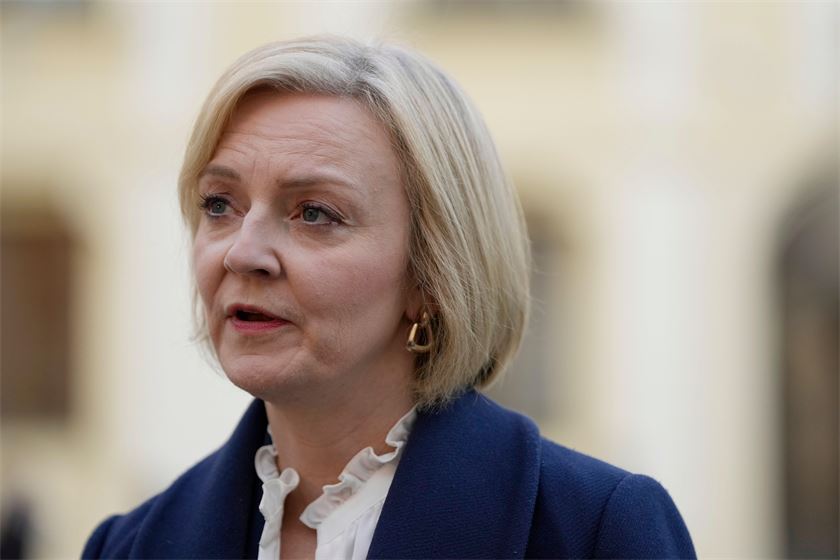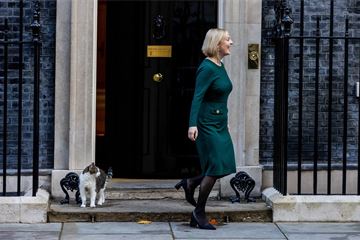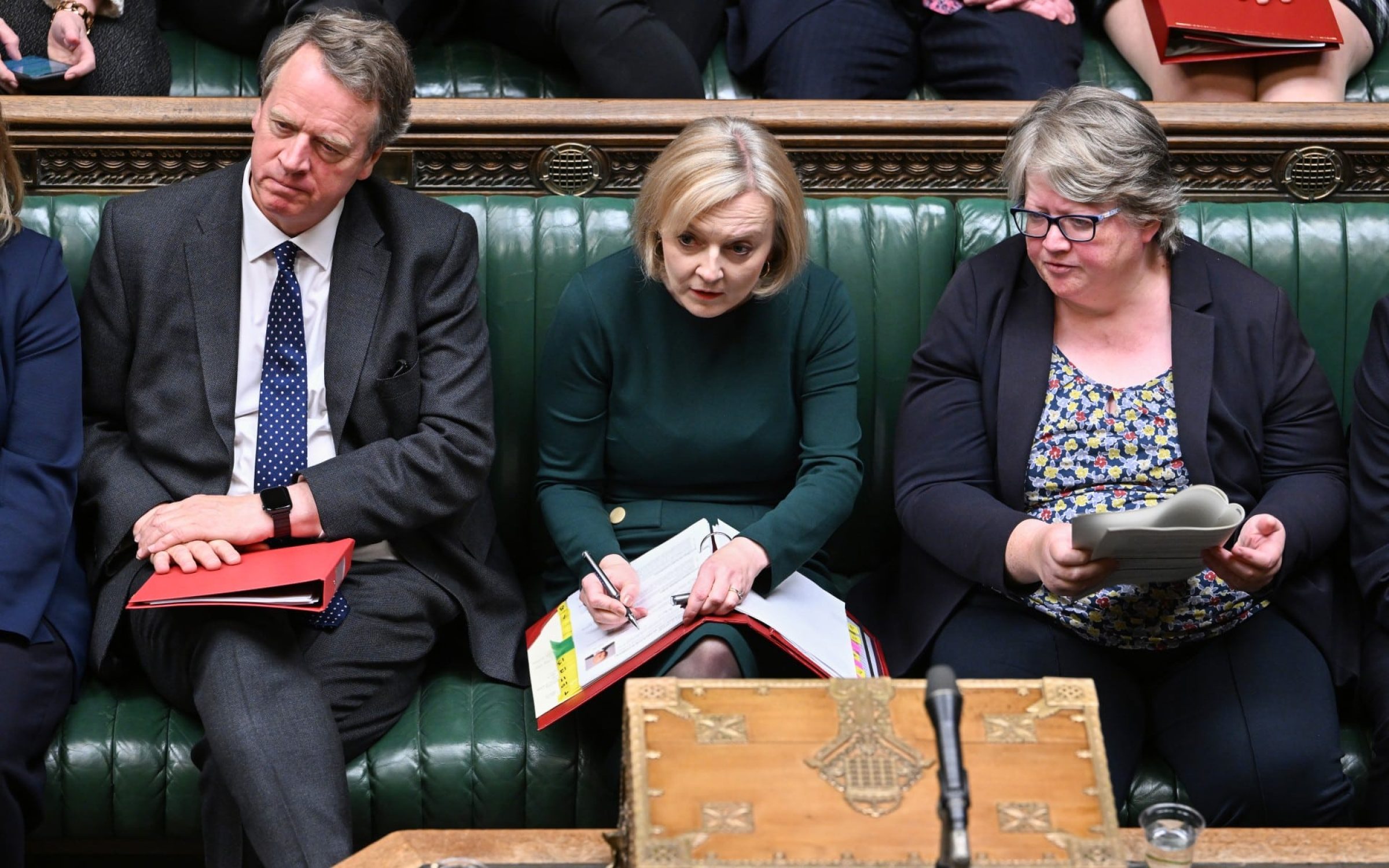UPDATED

UK: Jeremy Hunt replaces Kwasi Kwarteng as finance minister
Prime Minister Liz Truss has said Kwarteng had "put the national interest first" by agreeing to her demand that he step aside less than six weeks into the job.

Jeremy Hunt previously served as health and foreign minister
British Prime Minister Liz Truss on Friday dismissed Finance Minister Kwasi Kwarteng.
She named former Foreign Minister Jeremy Hunt as his replacement.
"You have asked me to stand aside as your chancellor. I have accepted," Kwarteng wrote in a letter to Truss.
The prime minister replied: "I deeply respect the decision you have taken today. You have put the national interest first ... I know that you will continue to support the mission that we share to deliver a low tax, high wage, high growth economy."
Why did Kwasi Kwarteng have to go?
Truss and Kwarteng have been scrambling to reassure markets and lawmakers after a September 23 tax-cutting "mini-budget" that plunged the UK into economic maelstrom.
Kwarteng had been in Washington for annual talks withthe International Monetary Fund. Before leaving the US capital, Kwarteng insisted he was safe in his role as Chancellor of the Exchequer, as the position of finance minister is known.
However, Truss had reportedly already been seeking a replacement to stave off threats to her own job. It is expected that a U-turn on that budget is to be announced later on Friday.
According to British media reports, Truss was considering reversing further aspects of her government's controversial plans, which sparked market turmoil when they were announced.
In September, Kwarteng announced tax cuts — twinned with heavy borrowing — that spooked markets.
That announcement sent interest that the government would have to pay on borrowing soaring. Meanwhile, thepounds sterling slumped to a record low against the US dollar.
The UK government has alreadyabandoned its intention to cut taxes for the highest earners. Multiple media reports have also suggested Truss and Kwarteng are about to reverse a decision to halt a rise in business tax.
What might happen next?
TheUK's central bank has moved to reassure investors, including pension funds, that have lent money to the UK government.
The Bank of England began an emergency purchase scheme of government debt bonds at the end of September, hoping to stave off a market collapse. However, those efforts are set to end on Friday.
The financial and political chaos has fueled speculation about whether Truss can survive in office after less than 40 days as prime minister.
Truss — the fourth prime minister in six years in Britain — was elected by members of the Conservative Party rather than the broader UK electorate.
jsi, rc/fb (dpa, AFP, Reuters, AP)
DW RECOMMENDS
British government denies Truss tax cuts reversals, but chancellor says "lets see"

UK Prime Minister Liz Truss' government denies multiple media reports that it is in talks to reverse some of the huge tax cuts it has proposed in the chancellor's mini-budget.
Oct. 13 (UPI) -- The British government is denying media reports that it is in talks on a policy U-turn on cutting corporate tax rates in Chancellor Kwasi Kwarteng's mini-budget.
As economic fallout continues from Prime Minister Liz Truss' huge tax cut, Kawarteng said the position hasn't changed, but said, "let's see" when asked about a potential reversal.
Media reports Thursday said the government is in talks to scrap some of Truss' fiscal plan - including corporate tax and dividend tax cuts - in the chancellor's mini-budget.
According to BBC News, Chancellor Kwarteng said, "Our position hasn't changed." But under questioning he also said, "let's see" when asked about the potential U-turn on tax cuts, according to The Guardian.
RELATED Truss says government will not slash spending despite tax cut plan
He also refused to rule out changing other aspects of the Truss government's £43 billion tax cut package.
According to Sky News, the prime minister's official spokesman confirmed the government's fiscal policy hasn't changed, saying, "Yes, as I said to a number of questions on this yesterday -- and the position has not changed from what I set out to you all then."
The British government just last week revealed a plan to eliminate the top 45% taxation rate on earnings above $168,000 a year as Truss after public backlash against it.
The British pound plunged against the dollar and there was a bond sell-off when Truss first announced the massive tax cuts.
But on Thursday, the pound rose 1.8% against the dollar after multiple, media reports said the government was in talks to do away with parts of the unfunded tax cuts.
On Wednesday, Truss said during prime minister's questions in Parliament that she's not willing to slash public spending amid the tax cuts.
RELATED British PM Liz Truss vows to push ahead with tax-cut agenda
The Institute of Fiscal Studies said earlier this month that the British government would need to find $69 billion in some combination of spending cuts or tax increases to avoid increasing the British public debt.
'Difficult decisions needed': Truss walks back on spending cuts pledge
Departments face uncertainty over their budgets amid economic crisis

PM Liz Truss. Photo: PA/Alamy
By Tevye Markson
13 Oct 2022
The prime minister has backpedalled after telling MPs there will be no public spending cuts in the wake of last month's mini-budget.
During prime minister’s questions on Wednesday, Liz Truss reaffirmed her commitment to not making public spending cuts to fund her controversial tax cuts and borrowing plans.
But Truss’s spokesperson later warned: “We are clear there will need to be difficult decisions to be taken given some of the global challenges we’re facing."
The PM had told MPs in the commons that she would “absolutely” keep her promise to maintain current spending levels.
Instead, she said the government would “make sure we spend public money well”.
She told MPs that public spending has risen considerably over the past 12 years, from £700bn in 2010 to £1 trillion now, and said this will continue. However, this is a nominal increase rather than a real-terms rise.
Truss’s spokesperson later added: “The prime minister was clear that government spending will continue to rise but beyond that it really is for the chancellor to come forward with anything on spending which he will do on the 31 [October].”
Related

12 Oct
by Eleanor Langford
Kwasi Kwarteng has moved his medium-term fiscal plan up to the end of this month, from November, in a bid to quell market turmoil.
The Institute for Fiscal Studies has estimated that the government will need to make £60bn worth of spending cuts in order to pay for the government’s economic plan.
Truss may have to balance out the cost of helping households and businesses with energy bills with department spending cuts, according to reports. But the PM’s spokesperson refused to answer whether this was being considered.
Meanwhile, Treasury minister Chris Philip told the Commons yesterday that departments will still get real-terms increases in their budgets over the next few years.
He said: “I would point out to the house that [the 2021 Spending Review] spending limits do see real-terms increases over the three years. But we are going to be sticking with iron discipline to those spending limits, and not increasing them. And we will also show spending restraint in the years ahead. But showing spending restraint is different to real-terms cuts.”
“And we will also show spending restraint in the years ahead. But showing spending restraint is different to real-terms cuts,” he added.
In the SR21, the government said real-terms spending would increase for departments by 3.3% per year on average from 2021-22 to 2024-25.
However, soaring inflation has wiped out much of this estimated uplift, which was based on inflation averaging 2.3% over this parliament.
Meanwhile, Truss has reportedly been told by senior civil servants that she needs to do make more U-turns on last month’s so-called mini-budget, including raising corporation tax to restore market confidence.
Officials have warned the PM that her tax-tumbling budget is “no longer credible” without risking a financial crisis, according to The Times.
This morning, foreign secretary James Cleverly refused to rule out further U-turns to the plan and the government is under growing pressure to reverse some of its budget proposals.
Mark Fox
October 13, 2022

Politics, it is often said, is a cruel old business. You work hard for years to climb up Disraeli’s greasy pole. You toil away – voting for things you don’t agree with, supporting policies you think are wrong, being friendly to colleagues you can’t stand, being lampooned by journalists you feel “don’t get it”, harried by constituents whose votes you need but whose presence you secretly resent – in the hope that one day you too will reach the top and that a nation, relieved that you are now in charge, will gratefully and wholeheartedly support you. Most of all, a party that has managed to lose three consecutive leaders and Prime Ministers will now settle down and give you the support they withdrew from your predecessors. You might also be forgiven for thinking that, given the fact that your immediate predecessor left behind a government that was, shall we say, enveloped by an inverted pyramid of piffle and that the country’s longest and most glorious reigning Monarch unexpectedly died on virtually your first day in office, said party, press and public might be inclined to cut you a bit of slack while you moved your stuff into No 10 and got your feet under the table. These thoughts, understandably, might be crossing the Prime Minister’s mind as she sits in the Cabinet Room pondering the future of her administration. This is not, of course, how politics works.
For a variety of reasons and causes, the substance of which we need not ponder on here, the Prime Minister and her Chancellor have lost the confidence of the financial markets and increasingly the Parliamentary Conservative Party. Whether this is fair or not, right or wrong is not the point. The fact that these are the realities of the situation in which the government now finds itself are beyond dispute. Time is not on the Prime Minister’s side. The Chancellor resolutely clings to saying he will deliver his next financial statement at the end of October. This is itself an earlier date than the one he originally set out, but is in reality too far off to be sensible in the current set of circumstances.
The Chancellor should clearly resign. He should not force the Prime Minister to sack him. He commands no confidence in the City and little at Westminster. The fairness or otherwise of this position is not the point. It is what it is. By resigning the Chancellor makes it much easier for the Prime Minister to execute the changes she needs to deliver to restore financial equilibrium. If he does do the honourable thing and he also can have some hope that, if he wants it, his political career can be resurrected in a lower level Cabinet job in the future. If he forces the Prime Minister to sack him then he makes life much harder for the Prime Minister and will burn up much residual personal goodwill from colleagues who will be personally sympathetic to his plight even if they are politically furious with him.
In no other walk of life is changing your mind seen as a weakness. We all make mistakes and we all change decisions or courses of direction. Only in politics is “u-turning” seen as weakness. Only in politics is admitting a mistake and putting it right seen as a weak thing to do, but there it is. That’s just how it is. So if the Prime Minister is to preside over a change in tack then she needs to do it with brillo, with elan, with style, and with dynamism. If policy changes are afoot then the Prime Minister needs to deliver them with a smile and sparkle. Her Cabinet, every single one of them, needs to get behind her and pull in the same direction. The government as a whole, every single member of it, needs to pull their weight and go out and back the PM and the new plan.
‘Morally corrupt and intellectually vapid’: James O’Brien delivers vicious blows in Jacob Rees-Mogg's direction
13 October 2022,
James O’Brien did not hold back in his brutal monologue on the current state of the Conservative Party, highlighting Jacob Rees-Mogg’s recent comments on the mini-budget.
James O’Brien had some sharp words for Business Secretary Jacob Rees-Mogg in a vicious takedown today.
“You want to pick a low point?” James asked, “Probably Jacob Rees-Mogg yesterday, trying to argue that the reaction to the mini budget had nothing to do with the mini budget.
“I know we are fairly tireless chroniclers of Jacob Rees-Mogg’s moral corruption and intellectual vapidity but that was a true milestone in his appalling contributions to public discourse in this country - trying to argue that the response to the mini budget had nothing to do with the mini-budget.”
In a further blow, James added: “It’s like trying to argue that the bruising around your eye has nothing to do with the punch in the face you received yesterday, but hey-ho, Jacob’s gonna Jacob."
This comes after the fallout from the Chancellor’s mini-budget which saw the pound plummet to an all-time low against the dollar, a rare statement of condemnation from the IMF over the 45p tax rate cut, and a subsequent U-turn on the policy while the Conservative Party Conference was still in motion.
The Business Secretary previously defended Kwasi Kwarteng, telling Jon Sopel and Emily Maitlis on the News Agents podcast that he is “a very brilliant man…who has shown wisdom and flexibility in realising that something was becoming a distortion that wasn’t of fundamental importance”, referring to the government’s climbdown on the the policy.
Comparing the nation's first and current female Prime Ministers, James added:
“Margaret Thatcher at the time of the poll tax was high on years of electoral success. She was almost unlatched from reality, unlatched from political reality, by the insulation that electoral success gave her.
“Quite how Liz Truss could have ended up so low so fast is still actually baffling me.”
James also noted that some of the economic problems the UK is experiencing “would still be here whoever was in Downing Street” but that “they are bigger than they would have been without Kwasi Kwarteng’s diabolical intervention and the response of the markets”.
Coral slashes on odds of Boris comeback©UK Parliament/Jessica Taylor
Well, what a turn up for the books: Coral has just slashed its odds in half to 8-1 (from 16-1) on Boris Johnson making a return to Number 10 to replace Liz Truss as prime minister.
After yesterday’s dire PMQs performance by Truss and her apparently dreadful outing at the 1922 committee, it’s perhaps no surprise that the bookmaker has slashed its odds. Tory MPs are deeply divided over whether she should stay or she should go.
Indeed, some of the Tory MPs most aghast at what has happened to the economy since Truss took over reckon that another regicide might be too much even for the most ruthless among them. Indeed, one MP told the New Statesman that the PM has a “few months or a year,” which, it must be said, is a fairly broad prediction.
Her closest allies agree. “Changing the leadership would be a disastrously bad idea,” foreign secretary and Truss faithful James Cleverly said this morning.
According to Politico, the consensus is that Truss will not face a challenge before Christmas – so she she can begin planning her Downing Street Christmas decorations after all. For one thing, Truss is protected from a leadership challenge for 12 months from her appointment as PM. Well, technically protected.
If, however, the party turns against her overwhelmingly, the rules will mean little. The men in white coats hiding their daggers visiting Truss at No 10 is the more likely approach, suggesting that she steps down for the sake of party – and country- unity. Without the option of a leadership election, those who wish to oust Truss must find a candidate that can unify the poles of the party. Paul Goodman, editor of ConservativeHome has billed the two closest runners in the leadership contest as the most likely replacements. One idea doing the rounds is that Penny Mordaunt and Rishi Sunak, who, after all, between them got pretty much two-thirds of the votes of MPs, come to some kind of arrangement and essentially take over,” Goodman said.
Ben Wallace, the defence secretary, is another name being mentioned. Wallace topped many of the Tory party members polls but decided against standing. Who knows, he may be persuaded should there be a vacancy. And then, course, there is the return of Boris. Time to place your bets.
Well, what a turn up for the books: Coral has just slashed its odds in half to 8-1 (from 16-1) on Boris Johnson making a return to Number 10 to replace Liz Truss as prime minister.
After yesterday’s dire PMQs performance by Truss and her apparently dreadful outing at the 1922 committee, it’s perhaps no surprise that the bookmaker has slashed its odds. Tory MPs are deeply divided over whether she should stay or she should go.
Indeed, some of the Tory MPs most aghast at what has happened to the economy since Truss took over reckon that another regicide might be too much even for the most ruthless among them. Indeed, one MP told the New Statesman that the PM has a “few months or a year,” which, it must be said, is a fairly broad prediction.
Her closest allies agree. “Changing the leadership would be a disastrously bad idea,” foreign secretary and Truss faithful James Cleverly said this morning.
According to Politico, the consensus is that Truss will not face a challenge before Christmas – so she she can begin planning her Downing Street Christmas decorations after all. For one thing, Truss is protected from a leadership challenge for 12 months from her appointment as PM. Well, technically protected.
If, however, the party turns against her overwhelmingly, the rules will mean little. The men in white coats hiding their daggers visiting Truss at No 10 is the more likely approach, suggesting that she steps down for the sake of party – and country- unity. Without the option of a leadership election, those who wish to oust Truss must find a candidate that can unify the poles of the party. Paul Goodman, editor of ConservativeHome has billed the two closest runners in the leadership contest as the most likely replacements. One idea doing the rounds is that Penny Mordaunt and Rishi Sunak, who, after all, between them got pretty much two-thirds of the votes of MPs, come to some kind of arrangement and essentially take over,” Goodman said.
Ben Wallace, the defence secretary, is another name being mentioned. Wallace topped many of the Tory party members polls but decided against standing. Who knows, he may be persuaded should there be a vacancy. And then, course, there is the return of Boris. Time to place your bets.










